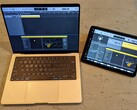It’s no secret that Apple’s silicon is without question the leading technology on the market. In its recent assessment of the new MacBook Pro M1 Pro and M1 Max chips, Anandtech called their performance “generally absurd,” adding that it “didn’t expect some of the monstrous increases that the new chips are able to achieve.” The Apple A15 Bionic chip found in the new iPhone 13 and iPhone 13 Pro models is actually the latest iteration of the A14/M1 architecture that underpins Apple’s new MacBook Pro chips.
We’ve already seen the impressive Geekbench 5 scores of the Apple A15 (SC - 1732/MC - 4685) along with the less impressive, but still solid Google Tensor scores (SC - 1036/MC - 2808). While the Tensor is outperformed by the Qualcomm Snapdragon 888 and the Samsung Exynos 2100 in the same test, Google has been emphasising the machine learning capabilities of the Tensor -- after all, they named it after their Tensor Processing Unit, developed specifically for neural network machine learning.
So, for Pixel fans, there appeared to be some solace in knowing that ML should be a particular strength of the Tensor chip. We can report, however, that when pitted against the Apple A15 in the new Geekbench ML test, the Google Tensor gets annihilated. Primate Labs, the developer of the Geekbench ML app, says it is a cross-platform test designed to “help you understand whether your device is ready to run the latest machine learning applications.” It has three components that separately test CPU, GPU and Core ML (A15) or NNAPI (Tensor) to exercise neural accelerators.
In the Geekbench ML TensorFlow Lite CPU test, the Apple A15 scores 939; by comparison, the Google Tensor scores just 307. In the GPU test, the A15 scores 2268 with the Tensor mustering just 1428 in response. In the neural accelerator test, the A15 scores 2727 (Core ML) while the Tensor scores just 1720 (NNAPI). The aggregate score of the A15 is 5,934. The aggregated score of the Tensor is 3,455. This puts the Apple A15 at around 71 percent faster than the Google Tensor in machine learning tasks, the supposed particular strength of this chip.
On one hand, it shouldn’t be surprising that Apple has done well here -- it has been heavily invested in custom designing its chips for years now. On the other hand, the result does take some of the gloss off the Google Tensor. Of course, it is a synthetic benchmark and the real world experience will be where it matters for people. The Pixel 6 has been performing well for us so far and Android 12 will undoubtedly benefit from the ML capabilities of the Tensor. Once again, however, Apple’s dominance in raw chip performance has come to the fore.
Pre-order the Google Pixel 6 from Amazon priced from US$599.
Source(s)
Own.




























